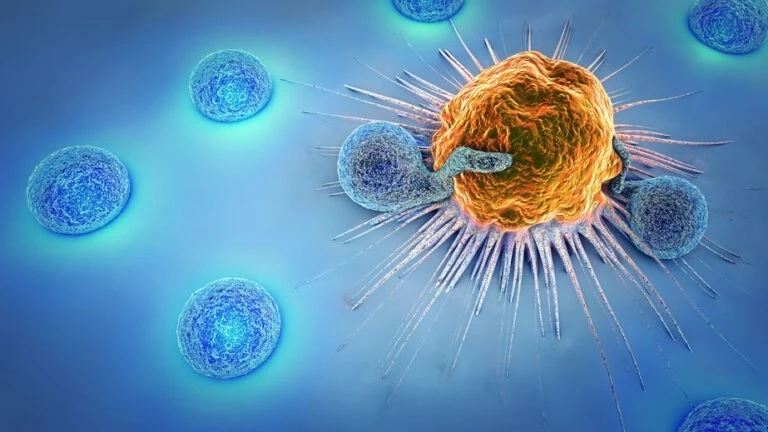Cancer remains one of the most challenging diseases to treat, largely due to its ability to evade the body\'s natural defense mechanisms. Traditional cancer treatments such as chemotherapy and radiation therapy, while effective, often come with significant side effects and can harm healthy cells. In recent years, however, advancements in biological cancer treatments—also known as immunotherapies—have revolutionized the landscape of oncology, offering new hope to patients through more targeted and personalized approaches.
What is Biological Therapy?
Biological therapy involves using substances made from living organisms to treat cancer. These therapies harness the body\'s immune system to fight cancer cells more effectively. The primary goal of biological therapy is to stimulate or restore the immune system\'s natural ability to detect and destroy cancer cells.
Types of Biological Cancer Treatments
1. Oncolytic Virus Therapy: This innovative approach uses genetically modified viruses that selectively infect and kill cancer cells while sparing normal cells. The viruses replicate inside the cancer cells, causing them to burst and die. Additionally, the process stimulates the immune system to recognize and attack remaining cancer cells. A well-known example is T-VEC (talimogene laherparepvec), which is derived from the herpes simplex virus.
2. Cancer Vaccines: Unlike traditional vaccines that prevent diseases, cancer vaccines are designed to treat existing cancers or prevent cancer from returning. They work by stimulating the immune system to recognize and attack specific proteins on cancer cells. For instance, the FDA-approved Provenge (sipuleucel-T) is a vaccine for prostate cancer that helps extend survival in men with advanced disease.
3. Adoptive Cell Transfer (ACT): This personalized therapy involves collecting and using a patient’s own immune cells to treat their cancer. One form of ACT is CAR-T cell therapy, where T cells are extracted, genetically modified to express chimeric antigen receptors (CARs) that target cancer cells, and then infused back into the patient. CAR-T therapies such as Kymriah (tisagenlecleucel) and Yescarta (axicabtagene ciloleucel) have shown remarkable success in treating certain types of leukemia and lymphoma.
4. Monoclonal Antibodies: These are laboratory-made molecules designed to serve as substitute antibodies that can restore, enhance, or mimic the immune system\'s attack on cancer cells. Monoclonal antibodies can be used alone or to deliver drugs, toxins, or radioactive substances directly to cancer cells. Examples include Rituxan (rituximab) for non-Hodgkin lymphoma and Herceptin (trastuzumab) for HER2-positive breast cancer.
5. Immune Checkpoint Inhibitors: These drugs help remove the "brakes" on the immune system, enabling it to recognize and attack cancer cells more effectively. Checkpoint inhibitors such as Keytruda (pembrolizumab) and Opdivo (nivolumab) have shown significant benefits in treating various cancers, including melanoma, lung cancer, and bladder cancer.
How Biological Therapies Work
The immune system consists of a complex network of cells, tissues, and organs that work together to defend the body against foreign invaders like bacteria and viruses. Cancer cells can often evade the immune system by exploiting certain regulatory pathways that normally prevent the immune system from attacking the body\'s own cells. Biological therapies aim to overcome these challenges in several ways:
- Enhancing Immune Response: Some therapies boost the overall activity of the immune system, increasing the number of immune cells or enhancing their ability to attack cancer cells.
- Targeting Cancer-Specific Antigens: By identifying and targeting unique markers on cancer cells, these therapies can help the immune system distinguish between healthy and malignant cells.
- Blocking Immune Suppression: Cancer cells often create an immunosuppressive environment. Biological therapies can inhibit these suppressive signals, allowing immune cells to function more effectively
Benefits and Challenges
Biological cancer treatments offer several advantages over traditional therapies:
- Precision: These therapies can specifically target cancer cells, reducing damage to healthy tissues and minimizing side effects.
- Personalization: Treatments can be tailored to individual patients based on the specific characteristics of their cancer and immune system.
- Durable Responses: Some patients experience long-lasting remissions and even potential cures.
However, there are also challenges associated with biological therapies:
- Complexity and Cost: Developing and manufacturing these treatments can be highly complex and expensive, often leading to high costs for patients and healthcare systems.
- Side Effects: While generally fewer than those of traditional treatments, biological therapies can still cause significant side effects, including autoimmune reactions where the immune system attacks healthy tissues.
- Resistance: Just as with other cancer treatments, some patients may not respond to biological therapies, or their cancer may develop resistance over time.
Future Directions
Research in biological cancer treatments is rapidly evolving, with ongoing efforts to improve existing therapies and develop new approaches. Promising areas of research include:
- Combining Therapies: Combining biological therapies with traditional treatments or other immunotherapies may enhance effectiveness and overcome resistance.
- Biomarkers: Identifying biomarkers that predict response to therapy can help personalize treatment plans and improve outcomes.
- Next-Generation CAR-T Cells: Advances in CAR-T cell therapy, including the development of CAR-NK (natural killer) cells and "off-the-shelf" CAR-T products, aim to make these treatments more accessible and effective.
Conclusion
Biological cancer treatments represent a paradigm shift in oncology, offering new hope for patients through more targeted, personalized, and effective therapies. While challenges remain, ongoing research and innovation continue to drive progress, bringing us closer to a future where cancer can be more effectively managed, if not cured. By harnessing the power of the immune system, biological therapies have the potential to transform the way we treat cancer and improve the lives of countless patients worldwide.
Sources
1. American Cancer Society. (2022). [Immunotherapy for Cancer](https://www.cancer.org/cancer/cancer-treatment/types/immunotherapy.html).
2. National Cancer Institute. (2022). [Biological Therapies for Cancer](https://www.cancer.gov/about-cancer/treatment/types/immunotherapy).
3. Mayo Clinic. (2022). [Cancer immunotherapy: Advances and challenges](https://www.mayoclinic.org/tests-procedures/cancer-immunotherapy/about/pac-20385258).
4. FDA. (2022). [Approved Cellular and Gene Therapy Products](https://www.fda.gov/vaccines-blood-biologics/cellular-gene-therapy-products/approved-cellular-and-gene-therapy-products).



